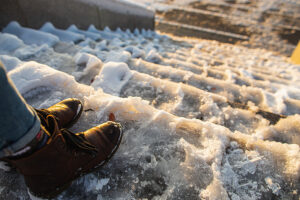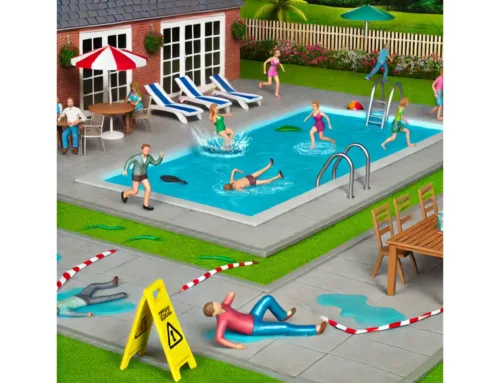Slip and fall accidents from icy conditions in winter are a leading cause of accidents in New Jersey. 25% of icy and snowy falls happen in parking lots. There are thousands of slip-and-fall accidents from icy, snowy and sleet conditions each year. Freezing temperatures quickly turn any precipitation into a slipping hazard, creating prime conditions for ankle sprains and fractures.
A common mistake people make after a fall on ice is to assume that if they can stand and walk, they do not need medical attention. The temptation to “walk it off” rather than go through the hassle of getting medical treatment can be tempting but trying to tough it out and continue using the injured ankle may just make the injury worse, potentially resulting in chronic joint instability, lasting pain, or arthritis in the future. Failure to immediately seek medical care for an injured ankle makes you more vulnerable to re-injuring the same ankle in the future. This is because the connective tissues in the joint have been weakened.

For some fall victims, there is no choice in the matter: for one such client, he looked at his foot after a fall on ice, saw it was facing in the wrong direction by 180 degrees, and was soon feeling the pain that went with such a severe displaced fracture. This client was taken from the scene by ambulance, of course, and was soon undergoing surgery.
The two major types of ankle injury that often result from slip and fall accidents under icy conditions are fractures and sprains. A fracture is a broken bone, which may or may not require an x-ray to diagnose. Some bone fractures, such as hairline cracks and chips, may be more difficult to detect without diagnostic scans. Trying to stand on the injured ankle is not an effective test for fracture; some breaks don’t prevent the joint from bearing weight, and some sprains render the ankle too weak or painful to support standing.
A sprain occurs when the connective tissues that hold a joint together are stretched or torn. Though these are soft-tissue injuries and broadly regarded as less severe than fractures, a serious sprain can be debilitating and may even require surgery to repair. It’s important that you seek prompt medical treatment even if you think you “only” have a sprained ankle, to ensure proper healing and reduce the risk of re-injury. If you cannot get to the emergency room right away, follow the recommended care procedure for sprain injuries, RICE: rest, ice, compression, elevation. Stay off your feet and avoid putting pressure on the injured ankle, apply ice packs to the site of the injury for 20-minute intervals to reduce swelling, use a compression bandage to reduce swelling and support the joint, and elevate the injured leg.
Icy or slushy walkways and parking lots are prime locations for the sort of slip and fall accidents that can cause ankle injuries. Even when the majority of an area seems clear, icy patches can lurk in areas that are shaded from direct sunlight by trees or buildings. On residential properties, it is the responsibility of the homeowner or landlord to ensure that safe walking paths exist, which may include shoveling snow, treating paths with salt or chemical ice-melt, or spreading sand to grit the path and provide traction.
Business owners have a duty to ensure that their patrons and visitors have safe pathways to walk. If you suffer an injury in a slip and fall accident because the owner of a residential or commercial property failed to fulfill their duty of care by neglecting to take reasonable measures to clear ice from walkways, you have the right to seek compensation for any medical treatment and other expenses resulting from your fall injuries. The liability standards in New Jersey are different for residential and commercial premises, so be sure to consult with a personal injury specialist when talking to an attorney about your options.
After suffering a slip and fall injury due to negligently maintained icy walkways, you should seek medical treatment right away if at all possible, and only then consider contacting a personal injury attorney. The sooner you begin working with an injury lawyer, the more quickly he or she can begin to gather evidence on your behalf and start building your case, if you have one. That leaves you free to focus on your medical treatment and recovering from your injury, trusting that your attorney will protect your right to obtain the compensation you need and deserve.
Contact MyNJInjuryLawyer
If you or a loved one suffered an injury in an accident in NJ, you should contact an attorney familiar with handling these claims. An experienced NJ Injury Lawyer will know how to obtain medical records, videos, photographs, experts, locate witnesses and contact the insurance company so you can make a claim for your injuries.
My NJ Injury Lawyer Howard P. Lesnik, Esq. offers complimentary strategy sessions to address any issue or questions you may have for your injury claim in NJ.
Please contact NJ Injury Lawyer Howard Lesnik, Esq., immediately if you were involved in an accident. I personally handle NJ personal injury cases on a regular basis. Please contact me now by email, by phoning 908.264.7701, or by completing the form to the right to schedule your complimentary 30-minute strategy session.






